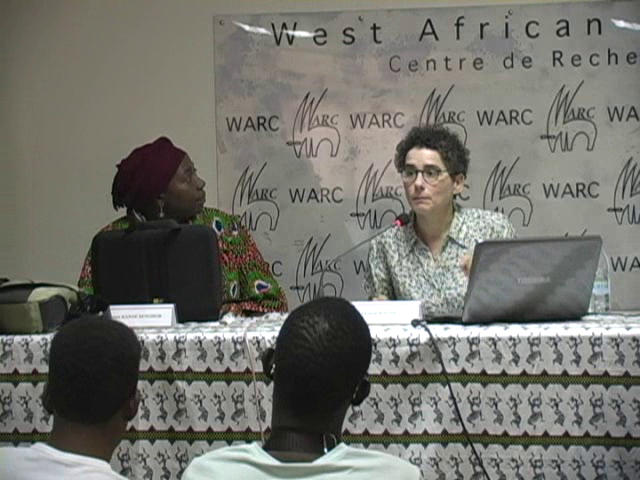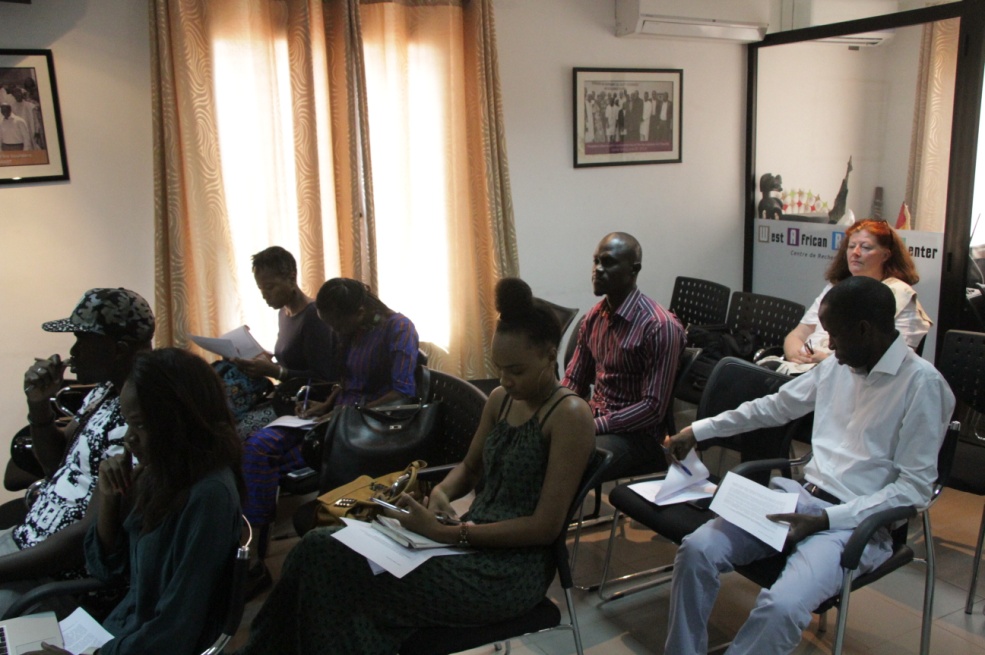
Join us in congratulating the Spring 2018 WARC Travel Grant Awardees! We are very excited about this round’s grantees seeking to tackle issues throughout West Africa, from clean water to food security, climate change, and disease prevention.
Hougnigbo Bertrand Akokponhoue (Université d’Abomey Calavi, Bénin), “ Utilisation de la Télédétection, des SIG et des méthodes géophysiques pour la recherche de l’eau dans les aquifères discontinus du socle cristallin du Bénin : cas du Département de la Donga (Nord-ouest du Bénin) ”
Ivo Kashimana (University of Lagos, Nigeria), “Impacts of Land Use Changes in Lower Black Volta (Ghana) and Lower Benue (Nigeria) River Basins: a climate change mitigation approach for food security”
Dambre Koungbanane (Université Félix Houphouet-Boigny, Côte d’Ivoire), “ Etude du risque d’inondation dans le contexte de changement climatique dans le bassin de l’Oti dans la Région des Savanes au Togo ”
Marguerite Nikiema (Université Ouaga I Professeur Joseph Ki-Zerbo, Burkina Faso), “Caractérisations phénotypique et génotypique des souches de Salmonella non-Typhiques (SNT) d’origines alimentaire et humaine au Burkina Faso: Contribution au développement de nouveaux vaccins.”
Funding for the WARC Travel Grant Program is provided by the Bureau of Educational and Cultural Affairs of the US Department of State through a grant from the Council of American Overseas Research Centers.
Tu Seras Docteur.e Mon Enfant
LES AUTEURS
Mariama Diallo, Doctorante à l’ EHESS Marseille.
| L’ouvrage est disponible à la vente en ligne et dans la boutique des éditions de l’ Harmattan à Dakar. Il sera également en vente au tarif exceptionnel de 10 000 FCFA le 21 juin lors de sa présentation. |
An Associate Professor of Art History at the University of North Carolina Chapel Hill, Dr Victoria Rovine conducted this presentation at the West African Research Center on Wednesday, June 7, 2017. The session was moderated by a young Senegalese filmmaker and design specialist, Mrs Fatou Kande Senghor. Fatou Kande has been working on style and design and integrates various components in her films. As it turns out, Kande’s teachings are based on the many articles and books written by Professor Rovine that she has read over the years. The two women discovered this hidden and unknown connection while sitting and discussing during and after the presentation.

left to right: Fatou Kandé Senghor and Dr Rovine
Dr Rovine’s presentation and research publications generated a high level of interest among attendees because of the importance of dress in Senegal and West Africa as a whole. It is a particularly intriguing topic because of the colonial origins of a number of materials (wax, fancy) regularly worn by Senegalese and other West African women and so expertly acclimated to the point of passing as local production.
The presentation was followed by lively and insightful conversations between the UNC Chapel Hill faculty member and the audience.

A partial view of the audience
A sequel to the pioneering study on Gender and the Judiciary in Africa: From Obscurity to Parity?, this book examines the issue of gender diversity, representative benches and international courts by focusing on women from the continent of Africa who have served in international courts. This study challenges existing discourse on gender diversity in international courts by arguing the need to disaggregate gender diversity with a view to understanding intra-group differences, strengths, challenges and contributions. While feminist legal scholars have interrogated the questions of gender diversity on international courts, no study has focused exclusively on who the women judges are, how they get to the courts and what happens when they get there. This book provides the first detailed account of women on international courts with a focus on African women. It provides a fresh and focal examination on the question of gender diversity by detailing the experiences of nine women judges. Situated within different theoretical frameworks, but drawing largely from postcolonial feminism, feminist institutionalism, feminist legal theory and legal narratives, this book brings together established scholars, creating a multidisciplinary platform for investigating questions on judicial appointments, gender, geographic location, class and professional capital, among others, combine to shape the lives of the African women who sit on international courts. Using primary data collected through personal interviews, each chapter provides glimpses into the lives and professional trajectory of each judge, providing a rich and theoretically grounded narrative which, would otherwise not be heard in mainstream feminist legal scholarship. The book makes an important contribution to feminist legal scholarship by using legal narratives as a tool to unveil the silences on the lives of women from Africa who have made great gains in accessing international benches. Furthermore, this book is positioned as a leading exposition on the need for documenting the contributions women from Africa are making to both domestic and international courts. The book makes critical contributions to African feminism, feminist legal scholarship, international law, gender studies and gender and judging. In essence, this book opens the door for future research on African women at the nexus of gender, courts, judging and international law and organizations. This book will be of interest to a wide variety of audiences including governments, policy makers, civil society organizations and for courses on women and genders studies, women and politics and feminist activists interested in all questions on gender and judging. The foreword is provided by Hon. Judge Gabrielle Kirk McDonald, former judge and president of the International Criminal Tribunal for the former Yugoslavia (ICTY) and former arbitrator, Iran-US Claims Tribunal (IUSCT).
Dak’Art: du 03 au 13 mai
Vernissage le 06 mai à 11h30
Projection de film: Bamba the Taste of Knowledge
Mardi 08 mai à 15h
WARA is happy announce the following winners of the 2018 WARA Fellowship competition:
Due to circumstances outside of our control, we regretfully have to cancel the lecture scheduled for April 11th, 2018 entitled: “Maama Jombo: the Senegambian roots of the New Orleans Voodoo queens and Masking Black Indians.”
We sincerely apologize for any inconvenience this may have caused.
Please keep an eye out for updates on a lecture this upcoming fall semester.
Bridgewater State University is holding a series of events as part of an Africa Awareness Week from the 26th to the 30th of March.
We hope to see you there!
For More Information Please Contact:
Dr. Louise Badiane
Lbadiane@bridgew.edu
508-531-2166
Join us this Spring at the following events!
The Religion in West Africa Series will be featuring:


The American Political Science Association (APSA) is accepting applications from early career scholars from Africa that would like to attend the mentoring workshop at this year’s Annual APSA meeting.
The annual APSA meeting will take place in Boston, MA (USA) from August 30 to September 2, 2018.
APSA will have funding grants for travel and logistics available.
Apply Here: https://connect.apsanet.org/s35/home/short-course-for-early-career-scholars-apsa/